The folding carton market is seen as ripe for deployment of digital print technology as evidenced by the large number of new presses that have been introduced in the last year. By Neel Madsen.
Smithers Pira’s latest forecast for the future of folding cartons predicts a compound annual growth rate (CAGR) of 4% for the period to 2022, taking the value of the global market from $100 million in 2016 to over $124 billion.
Changes in shopping and eating habits, along with new packaging formats are driving the demand for printed folding cartons. With more ready meals bought in store and takeaway food delivered through services such as Just Eat and Deliveroo, the humble folding carton has become infinitely more visible.
Digital print is perfectly positioned to meet this demand, as many smaller brands have come on the scene needing shorter runs of cartons, while the big chains want to keep their message fresh, offer promotions and respond to current trends on social media.
There were until recently only a few manufacturers on the digital folding carton scene. While many flatbed digital printers can be used to produce promotional cartons or very small runs, printing folding cartons digitally was niche. Now more carton printing companies are adding digital to their arsenal and they have a lot more presses to choose from.
Established technology
One of the first manufacturers to realise the potential for digital cartons was Xeikon, which developed its Folding Carton Suite as a new offering for narrow web printers. At its heart stands the five colour Xeikon 3500 digital press, which has a broad colour gamut range making it ideally suited for cosmetics, food, beverages and pharma segments. As part of the suite, the Xeikon X-800 digital front-end with fully automated workflow handles job preparation and print quality.
At drupa last year, a die-cutter was added to the offering. The FDU (Flatbed Die-cut) unit, which can process up 2000 sheets/hr of max 890 microns from either digital or conventional presses, makes inline production of digital folding cartons possible.
The Suite was the focus of the Xeikon stand at Interpack in Düsseldorf last month, where the company showed folding carton applications at 1200 dpi print resolution. Gert Geens, business development manager for folding cartons, said, ‘Folding boxboard and digital printing have a bright future ahead. We can help brands stand out and respond to key market trends of shorter run times, just-in-time requests, more variation, seasonal packaging, smaller lot sizes, optimised supply chains and personalisation.’
One of the latest installations of the Folding Carton Suite is in Finland at Jaakkoo-Taara Oy. Founded in 1935, the company aims employs 115 people and has an annual turnover of €16.5 million. It prints more than 20,000 packaging and printed projects each year, as well as commercial jobs.
Managing director Thomas Brusila explained the reasoning behind this choice, ‘We wanted to produce high print quality combined with increased efficiency and the ability to produce both cartons and labels. The new system will enable us to introduce serialised pharmaceutical packaging and personalised packaging and labels. With digital we can also easily produce security and tamper evident features and we think we will be able to add value by offering that.’
He continued, ‘We liked the fact it gave us the possibility to introduce a highly automated digital workflow that will enable us to increase our output efficiency. We can reduce errors and be faster and better. Streamlining production allows us to have a more collaborative approach and we can also be more flexible with how we work with our customers.’
Going wider
HP launched the wider 30000 digital press at drupa 2012. This can print up to 4600 B2-sized sheets per hour in thicknesses of 250-600 microns, in seven colours. Most recently, it was on show at Interpack, teamed with Infigo Software, Tresu’s iCoat flexo coater and a Kama DC 76 Foil ASB die-cutter, demonstrating personalised gift cartons in minutes.
A number of new installations have been announced over the past few months, including at Orda Group in Israel and Incarta in France. The first user in the UK is Lincolnshire-based Kalas Packaging, which is diversifying into the sheetfed packaging arena. ‘Our current core business of printed plastic horticultural care cards will be hugely complemented by this new addition to our portfolio. The HP Indigo 30000 will allow us to move into other niche commercial packaging markets and print on a vast array of synthetic and specialist board substrates requiring only small make readies,’ said sales director Matthew Evans.
Kalas managing director Jonathan Padley added, ‘We have always operated in niche sectors, and the unique capabilities of this equipment offer limitless opportunities for our customers to engage with their consumers. With the latest HP technology we’ll be able to maximise a host of new possibilities, including creating customised and personalised packaging, as well as incorporating virtual and augmented reality elements and track and trace capabilities that engage with cloud-based smartphone recognition apps.’
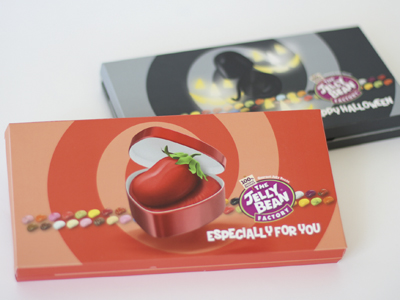
Folding carton packaging printed on an HP Indigo 30000
One interesting installation is at Italian Pixartprinting, owned by web-to-print specialist Cimpress, which is using the HP Indigo 30000 to broaden its online business. Named Catalyst, this new full packaging production line enables small print runs to be produced to industrial standards, allowing the company to offer a broader range of customised products and services from its online shop.
Pixartprinting can now offer digitally printed paperboard boxes with print runs starting from just 25 items for some ranges, while the online catalogue contains over 300 different combinations of format, size and customisation options.
As well as boxes made from creased, die-cut and glued 360 gsm pure cellulose paperboard, five food-contact packaging products are available, including trays, containers and deluxe takeaway boxes, made from Delipac paperboard and printed with food-safe inks. The new production line also offers the option of three different finishes using cold lamination as well as 3D and selective varnish.
‘We set ourselves two objectives: on the one hand, to offer our customers a new tool to grow their business; and on the other, to attract new users who, because of the way packaging has been offered up to now, have not previously had access to this type of product,’ explained Paolo Roatta, managing director. ‘Our strength lies in allowing customers to order very small print runs at affordable prices with increasingly sophisticated customisation options.’
Complementing the HP Indigo 30000 at Pixartprinting is a Harris & Bruno ExelCoat ZR30 inline coating machine that applies UV varnishes, and a Scodix line for tactile effects. A Bograma BSR 550 Servo Rotary rotary die-cutter with an integrated cold foiling module offers gold or silver coating. The line is rounded off by an automated Kama Flexfold 52i folder-gluer, while extra lamination is available from a Tecnomac Evolution 3 system.
New generations
As reported in previous issues, Xerox iGen presses have enabled UK cartons printers The Alexir Partnership, in Edenbridge in Kent, and Qualvis Print & Packaging, in Leicester, to set up new departments to offer digitally printed cartons to their customers. When configured with the ‘thick stock’ option, the iGen press family can print cartonboard up to 610 microns in speeds of up to 110 ppm at a resolution of 4800 x 600 dpi.
Alexir established its digital department two years ago to complement the litho operation, which turns out over 400 million cartons per year. The company has since helped many brands get on shelf through leveraging the advantages of digitally printed cartons. Meanwhile Qualvis is in its first year on digital production with its world-first installation of two Xerox iGens presslines. Both companies chose Tresu coaters and Kama die-cutters.
‘Being first to the marketplace is always exciting, albeit challenging! We have worked very hard to develop the market in digitally printed folding cartons and the areas we highlighted as potential sectors have mainly come through,’ said Claire Summersby, partnership marketing manager. ‘We have been successful in bringing in customers with short-run needs and multiple designs as well as helping smaller companies get their products to market. Digital has also been instrumental in sampling new products to buyers and producing cost-effective larger volumes for focus groups and in-store trials.
The company is close to launching a web-to-carton online solution to existing and new customers. Ms Summersby said, ‘We see it as being a simplified and efficient ordering system for standard or bespoke profiles as well as repeat orders. This could be used for our own customers or as an add-on to their online packaging solution for the end user.’
The Jet Press 720S from Fujifilm can also be optimised for carton printing, as was highlighted at Interpack. The B2 production press uses Fujifilm’s own XMF workflow and can achieve native resolutions of 1200 x 1200dpi with its Samba printheads.
Configured for folding cartons by increasing the vacuum pressure around the drum, together with a redesigned vacuum jacket, the press can accommodate a more diverse range of heavier carton boards commonly used in packaging applications, offering commercial printers entry to new markets.
Belgian start-up Packaging4Professionals, or P4P, was the first company to take advantage of this new modification when it launched a web-to-print business based around the B2-sized press. The aim is to offer a fully “lean” operation and deliver cartons to customers all over Europe within 15 days of ordering.
‘Traditionally, clients in the packaging industry have doubted the ability of a digital press to match the quality of litho or flexo printing. However, our customers have been hugely impressed with the quality of the products we have produced on the Jet Press 720S. The feedback we have received has been universally positive and we are very confident that this will continue,’ said co-founder and CEO Mohamed Toual.
Testing initialised
This year will see many of newest presses aimed at the folding carton market reach their beta testing stage.
One of them comes from Heidelberg, which introduced the Primefire 106 B1 sheetfed press, equipped with Fujifilm Samba printheads and water-based inks, Heidelberg infeed, primer, coater and delivery, at drupa last year. Two pilot sites have been announced in recent months; the first is Multi Packaging Solutions, which started the pilot phase at the company’s German manufacturing facility in Obersulm, in January.
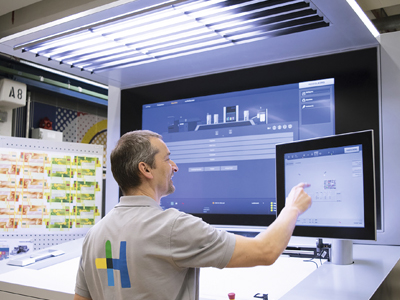
The Heidelberg’s Primefire 106 is now in production at colordruck Baiersbronn in Germany
‘Our customers include many well-known brand companies from industries like consumer and cosmetics. Fast, creative changes to the brand and product appearance are crucial here today to sales success. That’s why we offer these customers high-quality, flexible and variable or personalised packaging solutions that will enable them to tap into additional business potential and set themselves apart from their competition,’ said Steffen Schnizer, managing director and global head of beauty and personal care sales at MPS Obersulm.
Packaging service provider, colordruck Baiersbronn, in Germany, has also been confirmed as a pilot user of the Primefire 106. The family business is owned by the four daughters of the company’s founder Wilhelm Mack, and offers customised and specialised packaging solutions to industrial and commercial companies from the food, confectionery, pharmaceuticals and non-food industries.
‘Heidelberg Primefire 106 integrates seamlessly into our industrial print production and improves our flexibility, thus enabling us to respond to market trends more quickly and to implement new business models successfully. As the future will increasingly mean mass customisation in packaging, the Primefire 106 will provide us with the ideal basis for meeting up-and-coming requirements,’ commented managing director Martin Bruttel.
The AccurioJet KM-1 from Konica Minolta is a B2 plus-sized UV inkjet press that offers a wide range of media handling on both coated and uncoated substrates from 0.06 to 0.6mm. This means customers can use standard offset stocks without the need for pre-treatment or special digital substrates.
The KM-1 has now gone into production at Rehms Druck in Westphalia in Germany. A full print service company in the commercial and packaging print markets with several online outlets in its portfolio, the company plans to use the press for direct mail and packaging applications, including folding cartons.
Managing director Daniel Baier said, ‘We thoroughly tested the print quality of the Konica Minolta AccurioJet KM-1 against its competitors. And the quality and the results have really inspired us to make the investment now. The performance and return on investment that the press can deliver will allow us to expand our market capability as we move into the packaging market and continue to develop our direct mail capabilities.’
Streamlined operations
The first European beta installation of Landa’s S10 nanographic press has been revealed to be Edelmann, in Germany, which will install the press at its Heidenheim production site. The company will use its new capability to generate business growth from medium-run folding cartons.
Oliver Sattel, who is Edelmann’s technical director, commented, ‘Brands are actively looking to streamline their operations to remain lean and efficient, but not at the expense of product quality or price. The Landa S10 delivers this. It removes the previous barriers of minimum order quantities, with money tied-up in unnecessary printed stock and storage. This represents unprecedented flexibility that will interest not only our customers’ procurement departments, but also their creative teams too. We already have lots of interest for this new service, and are confident that Landa is the right partner and Nanography the only technology to deliver this capability.’
The printing company employs 2700 people, registers sales of €300 million and produces 5.5 billion packages and leaflets per year. Specialising in packaging solutions for health care, beauty care and consumer brands, the company has operations in Europe, Asia, North and South America.
Komori introduced the Impremia NS40 at drupa; a sheetfed inkjet press equipped with Landa’s nanography technology. Sun Print Solution, in Utah, was announced in September last year as a beta site. Jeff Isbell, president, said, ‘Watching the Impremia NS40 in action, I was excited because with this press the offset and digital worlds finally merged. Whether the job is short run, long run or requires variable data, the press no longer cares. It just delivers superior print quality for each type of job at a low cost per page. It allows us to move work from our current offset and digital equipment for a savings in both time and money that we can pass on to our customers.’
Another development last year saw KBA partner with Xerox to introduce the VariJet 106 press for folding cartons. This B1 press combines the strengths of Xerox Impika inkjet technology and the sheetfed platform of the KBA Rapida 106 to produce up to 4500 sheets per hour on substrates from 0.2 to 0.6mm in thickness.
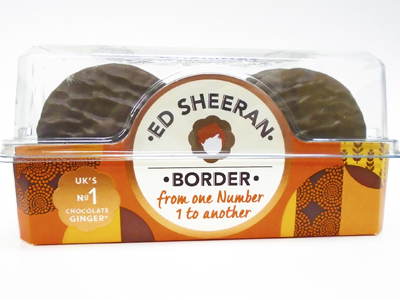
Qualvis creates personalised packs for Border Biscuits
Border Biscuits teamed up Qualvis Print & Packaging to send personalised digitally-printed packs of its biscuits to Ed Sheeran, ahead of the singer’s recent performances in Glasgow.
The company wanted to celebrate the 30th anniversary of its ‘Dark Chocolate Gingers’, the number one special treat biscuit in Scotland, by sending Ed Sheeran unique packs matching his hair colour, along with the message ‘From one Number 1 to another.’ The packs were developed in the new Innovations Studio at Qualvis.
Creative director Richard Pacey said, ‘We had previously pitched the marketing potential of our digital print capability to Border Biscuits. They then approached us to come up with the artwork concept for the Ed Sheeran marketing initiative. As time was tight, we managed to turn around the concept artwork in a day. Once the preferred concept was selected, we finalised the formal copy on the pack, digitally printed a short run and couriered the finished packs to Borders Biscuits in advance of their deadline. The whole project from concept ideation in our innovation studio to delivery of the final packaging took less than five days!’
He concluded, ‘Our work for Border Biscuits is exactly where digital can create added value – feeding demand for short run work and providing our customers with the opportunity of variable personalised printing, prototyping and market testing with the added advantage of quick turnaround.’
Read the full July issue here

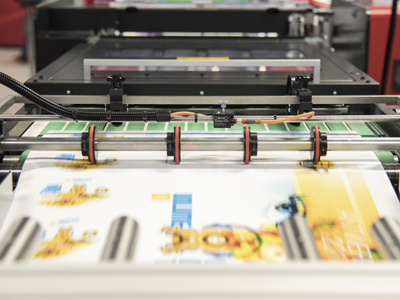

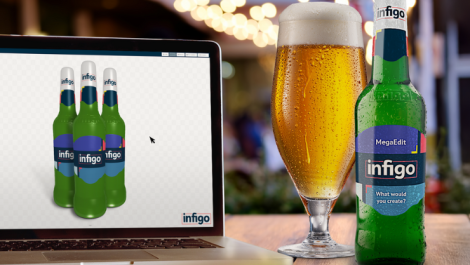
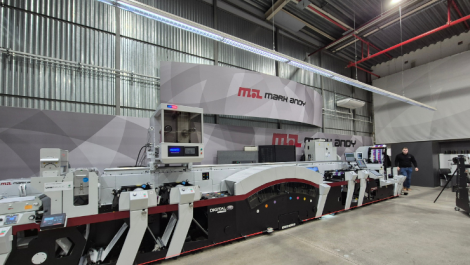
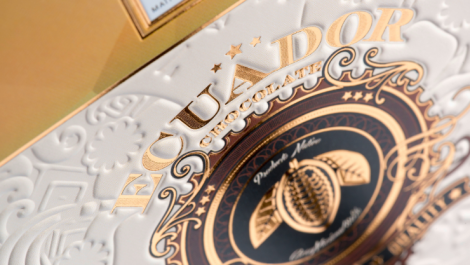

I like how you mentioned the fact that changes in shopping and eating habits, as well as packaging formats, are now influencing the demand for printed folding cartons ever since folding cartons have become more mainstream with food delivery and pick-up services gaining speed as of late. Another thing to notice is that there are a lot more carton printing companies stepping up their game when it comes to printing foldable cartons since the demand for them has been on the rise (and doesn’t look like it’s going to stop anytime soon). If I had the chance to hire a printing press when it comes to printing foldable cartons, I would want to make sure that the design I choose is something highly visible and eye-catching.